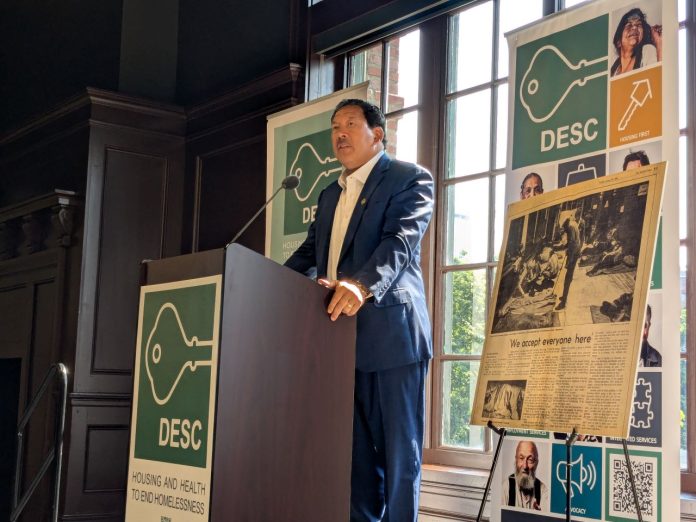
A few days before the August 5 primary election, I was surprised to see a new TikTok account appear from the City of Seattle – which, for the first few weeks of its existence, featured Mayor Bruce Harrell in every video.
I wasn’t the only one who was surprised. Hannah Krieg at The Burner reported on the new account on August 21, noting that only after she requested a comment about the Harrell-heavy content did the City TikTok account post content that didn’t include Harrell. Krieg also reported that the City’s Instagram account, which had already been in existence well before the primary, had also been heavily featuring Harrell in its content.
My eyebrows went up even further when I read in a Seattle Times article by Jim Brunner and David Kroman a few days ago that Harrell had been paying Christian Sinderman, his campaign consultant, out of mayor’s office funds for several years. Brunner and Kroman rightly described this arrangement as “unusual.” Sinderman is the founder and principal of NWP Consulting, a high-powered political consulting and lobbying firm with a large client list.
What surprised me about these stories is how the behavior they describe flew in the face of advice and training my colleagues and I had received in early 2013 from members of the Seattle Ethics and Elections Commission, including its director Wayne Barnett, about the rules barring the use of City resources to campaign for office. At the time, I worked as Senior Communications Advisor to Mayor Mike McGinn, who was gearing up for a reelection bid that he narrowly lost.
As one of the lead communications staffers in the McGinn Administration, I sat through trainings and read notes that were given to us by independent City staff to guide our work during the upcoming reelection campaign. We already knew that we could not use any City resources to do campaign work, including City-owned computers, cellular phones, seattle.gov email addresses, office space, or the secure non-public WiFi.
We were additionally told that if we wanted to do anything related to the campaign, we had to physically leave the mayor’s office, use public WiFi on our own personal computers, and be sure to mark on our Outlook calendars that we were out of the office and not doing campaign tasks on the public’s dime.
One piece of advice that stood out to me was that we could not suddenly start new forms of communication, or patterns of communication, during the campaign that we hadn’t already been using before the campaign got under way. For example, we could not begin sending out a regular newsletter to the public from the mayor’s office if we hadn’t already been doing so prior to the campaign. McGinn started sending a regular newsletter as soon as he took office, so we were good on that front. But we were also told that we could not change the frequency of such communications – that if we suddenly sent out additional newsletters each week during the campaign season, that could be seen as a violation of City policies and state law.
Similarly, we were told that if McGinn were to hold more press conferences than he did before the campaign got under way, that could also be construed as a violation of policies and laws.
Launching a brand new TikTok account using City resources that solely featured Bruce Harrell, and doing it the week before the primary election, struck me as a pretty obvious violation of City policy. But that was based on the advice I remember receiving 12 years ago. Would SEEC be concerned by Harrell’s actions as well?
Barnett told Krieg “I’m not going to say this is a problem, but nor am I going to say it is not a problem…I will look into it.” An unidentified party then filed a formal complaint to SEEC about Harrell’s use of City resources on the social media accounts.
Unfortunately, what happened next did not surprise me at all. Barnett dismissed the complaint. The party that filed the complaint has appealed the dismissal.
According to Krieg’s reporting, Barnett concluded that the “content and style” of Harrell’s posts did not constitute electioneering, despite the fact that this was totally new content and of a style that exclusively featured Harrell for its first few weeks.
Barnett relied on a 2005 SEEC ruling that found then-mayor Greg Nickels violated City policy by putting out a booklet during his reelection campaign titled “Mayor Greg Nickels THREE YEARS OF ACCOMPLISHMENTS: Making a difference in people’s lives.”
Of course, social media was in its infancy in 2005. Facebook still required users to register using a .edu email address. YouTube and Twitter weren’t launched until 2006. Instagram came along in 2010, and TikTok in 2016. Harrell launching a City TikTok account highlighting his accomplishments the week before the August primary is, in my view, the digital equivalent of publishing a booklet about his accomplishments.
Similarly unsurprising was news that Barnett also saw no problem with Harrell hiring his campaign consultant to do consultant work using a no-bid contract, while acting as a de facto mayoral staffer. Sinderman’s presence in the mayor’s office was “ubiquitous” – one former Harrell staffer said: “He was everywhere… He was the political eyes and ears.”
Sinderman was regularly working from inside the mayor’s office itself, but used his personal email address rather than a city address. Sinderman also continued to work for other candidates for office, giving him unique access that benefitted his firm.
According to Brunner and Kroman, Barnett “gave Harrell’s office the green light for the contract, so long as no city resources went toward campaign work… ‘It’s different, it’s strange, but I couldn’t find anything about it that is, by definition, illegal,’ he said.”
Barnett’s blessing of Harrell’s use of TikTok and of hiring Sinderman as a consultant doesn’t surprise me. As McGinn regularly pointed out to his staff when he was mayor, it was clear that the political establishment in Seattle holds progressive candidates to stricter, higher standards than it holds other members of that same establishment.
Would a Mayor Katie Wilson be let off the hook if she was using City resources to campaign for reelection, or pay her campaign consultant in a “strange” arrangement? I strongly doubt it.
On October 1 SEEC will hear the appeal of Barnett’s decision to dismiss the complaint about Harrell’s use of City resources to launch a new social media channel the week before the primary election. SEEC does take public comment, but their website notes that “Comments must be received by 4:00 p.m. two business days before the scheduled Commission meeting.” I know I’ll be letting SEEC know my feelings on the matter: that ethical standards, City policies, and state laws should apply to everyone, including Bruce Harrell.
Robert Cruickshank was Senior Communications Advisor to Mayor Mike McGinn from 2011 to 2013.

Robert Cruickshank
Robert is the Director of Digital Strategy at California YIMBY and Chair of Sierra Club Seattle. A long time communications and political strategist, he was Senior Communications Advisor to Seattle Mayor Mike McGinn from 2011-2013.
